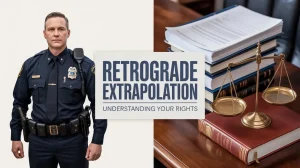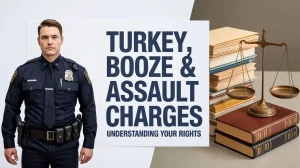Miranda rights in North Carolina give real effect to the Fifth Amendment privilege against compelled self-incrimination. Miranda becomes relevant the moment law  enforcement transitions from general investigation to custodial interrogation, limiting what officers may ask before warnings (the advisement of legal rights) are given and what statements prosecutors may later use at trial.
enforcement transitions from general investigation to custodial interrogation, limiting what officers may ask before warnings (the advisement of legal rights) are given and what statements prosecutors may later use at trial.
The December 2025 decision of the North Carolina Court of Appeals in State v. Mitchell provides an illustration of how Miranda is applied in real-life, sometimes complicated scenarios. Miranda disputes are resolved by analyzing custody and interrogation standards, not the outward circumstances of a search or arrest. It can be an opaque (at times) doctrinal line between permissible police questions and unconstitutional interrogation.
If you have questions about your Miranda rights in North Carolina or are uncertain whether law enforcement complied with Fifth Amendment protections, Bill Powers at the Powers Law Firm has more than thirty years of practical courtroom experience handling criminal charges in North Carolina. Bill Powers is a widely recognized defense attorney dedicated to legal education and advocacy. He is a former President of the North Carolina Advocates for Justice and a recipient of the North Carolina State Bar Distinguished Service Award. Call or text 704-342-4357 to schedule a confidential consultation.
 Carolina Criminal Defense & DUI Lawyer Updates
Carolina Criminal Defense & DUI Lawyer Updates














 This is most commonly seen in serious vehicular prosecutions where impaired driving serves as a predicate offense, including collision investigations involving injury or death, where scene management, medical transport, search warrant procedures, and hospital blood draws may delay specimen collection for three or more hours.
This is most commonly seen in serious vehicular prosecutions where impaired driving serves as a predicate offense, including collision investigations involving injury or death, where scene management, medical transport, search warrant procedures, and hospital blood draws may delay specimen collection for three or more hours. (sometimes called DUID – driving under the influence of drugs) or “drugged driving” by the general public, the forensic analysis and legal issues tend to be significantly more complex.
(sometimes called DUID – driving under the influence of drugs) or “drugged driving” by the general public, the forensic analysis and legal issues tend to be significantly more complex.  a crime. If you or a loved one face charges related to Criminal Attempt in NC, understanding this distinction can be fundamental to formulating an effective defense strategy. The difference is not merely academic. It is the line that separates a “thought crime” from a felony conviction. This distinction rests primarily on two fundamental concepts. those being the required intent and the overt act.
a crime. If you or a loved one face charges related to Criminal Attempt in NC, understanding this distinction can be fundamental to formulating an effective defense strategy. The difference is not merely academic. It is the line that separates a “thought crime” from a felony conviction. This distinction rests primarily on two fundamental concepts. those being the required intent and the overt act. behind BAC tests is powerful, but it is also technical, layered with protocols, human decision points, and laboratory processes that must be followed with precision. When a “drunk driving” case shifts from the roadside to the laboratory, the entire conversation changes. You move from dexterity exercises to molecular chemistry, and from visible performance to physics, gas chromatography and mass spectroscopy, both topics that an average juror would never see unless brought to life at trial by defense counsel.
behind BAC tests is powerful, but it is also technical, layered with protocols, human decision points, and laboratory processes that must be followed with precision. When a “drunk driving” case shifts from the roadside to the laboratory, the entire conversation changes. You move from dexterity exercises to molecular chemistry, and from visible performance to physics, gas chromatography and mass spectroscopy, both topics that an average juror would never see unless brought to life at trial by defense counsel. table. As a Charlotte criminal defense attorney who has practiced in Mecklenburg County for more than 30 years, I can tell you this without hesitation the Wednesday before Thanksgiving through the Sunday after is one of the busiest stretches of the year for assault arrests. Add alcohol, old grievances, political arguments, and the pressure of hosting (or being hosted by) people you strategically avoid the other 51 weeks of the year, and you have a recipe for criminal charges.
table. As a Charlotte criminal defense attorney who has practiced in Mecklenburg County for more than 30 years, I can tell you this without hesitation the Wednesday before Thanksgiving through the Sunday after is one of the busiest stretches of the year for assault arrests. Add alcohol, old grievances, political arguments, and the pressure of hosting (or being hosted by) people you strategically avoid the other 51 weeks of the year, and you have a recipe for criminal charges. offenses also taxes and therefore profits them. Is that right? Does that make sense? Should the government profit from crime? Is it OK to tax Drugs? Extortion? What about Illegal Pornography, Prostitution and Human Trafficking? Where do we, the governed, draw the line?
offenses also taxes and therefore profits them. Is that right? Does that make sense? Should the government profit from crime? Is it OK to tax Drugs? Extortion? What about Illegal Pornography, Prostitution and Human Trafficking? Where do we, the governed, draw the line? prosecution and defense of DWI cases in North Carolina. The first installment examined the limits of chemical testing. The second article turned to the machines that interpret alcohol breath samples into evidence, using the “breathalyzer.” This post focuses on the field sobriety tests or “SFSTs” that often precede BAC testing.
prosecution and defense of DWI cases in North Carolina. The first installment examined the limits of chemical testing. The second article turned to the machines that interpret alcohol breath samples into evidence, using the “breathalyzer.” This post focuses on the field sobriety tests or “SFSTs” that often precede BAC testing. question in constitutional law. When government agents enter private property without a warrant, what happens to the evidence they obtain?
question in constitutional law. When government agents enter private property without a warrant, what happens to the evidence they obtain?